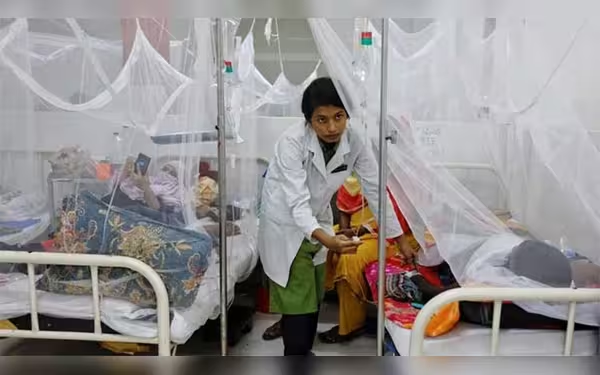Saturday, November 16, 2024 05:48 PM
Dengue Cases Surge in Punjab: 126 New Infections Reported
- 126 new dengue cases reported in Punjab in 24 hours.
- Total dengue cases in Punjab reach 1,371 for 2024.
- Health department urges public to take preventive measures.
 Image Credits: dunyanews.tv
Image Credits: dunyanews.tvPunjab reports 126 new dengue cases, raising total to 1,371 in 2024. Health department urges preventive measures to combat the outbreak.
In recent weeks, the province of Punjab has been grappling with a concerning rise in dengue fever cases. Dengue, a viral infection transmitted by mosquitoes, has become a significant public health issue in many regions, including Pakistan. The Punjab Health Department has been closely monitoring the situation, and on Thursday, they reported a sharp increase in the number of confirmed cases.
According to the latest update, 126 new dengue infections were recorded in Punjab within just 24 hours. This alarming spike has brought the total number of dengue cases in the province to 528 over the past week alone. As a result, the cumulative total of dengue cases for the year 2024 has now reached 1,371.
The rise in dengue cases is particularly troubling as it highlights the ongoing challenges faced by health authorities in controlling mosquito populations and preventing the spread of the virus. The health department has urged residents to take necessary precautions, such as eliminating standing water where mosquitoes breed and using mosquito repellent.
It is essential for the public to remain vigilant and informed about the symptoms of dengue fever, which can include high fever, severe headaches, pain behind the eyes, joint and muscle pain, and rash. Early detection and treatment are crucial in managing the disease effectively.
As the situation develops, it is vital for communities to come together and support one another in combating this health crisis. Awareness campaigns and community engagement can play a significant role in reducing the incidence of dengue. By working collectively, residents can help protect themselves and their families from this potentially dangerous illness.
The recent surge in dengue cases in Punjab serves as a reminder of the importance of public health measures and community cooperation. Staying informed, taking preventive actions, and supporting health initiatives can make a significant difference in controlling the spread of dengue and ensuring the well-being of the population.













